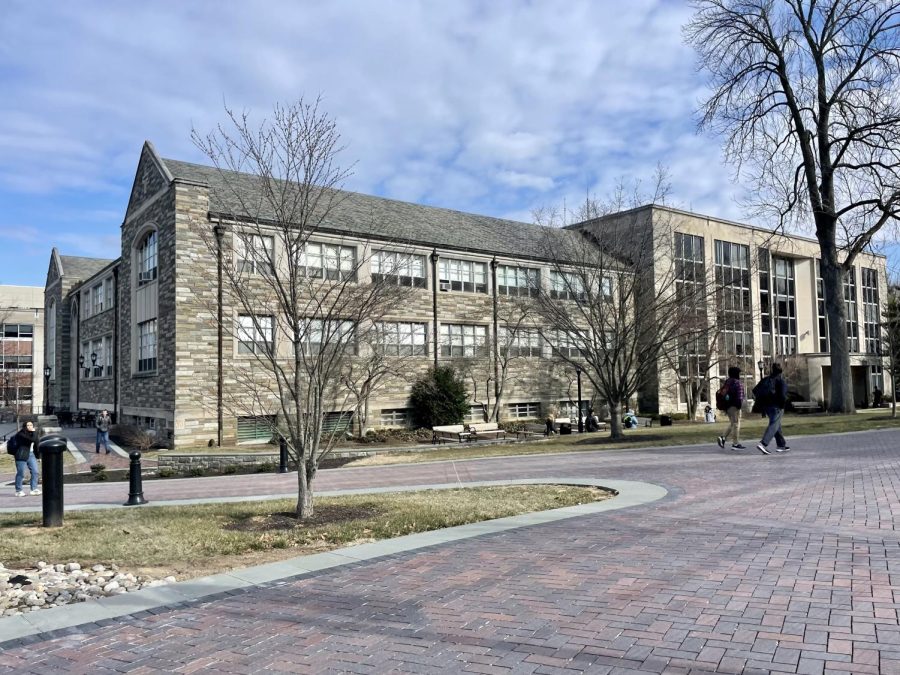GWS Faculty Spotlight Event
March 29, 2023
On Wednesday, March 23rd, the Gender and Women’s Studies Department hosted Dr. Megan Quigley for its “GWS Faculty Spotlight Lecture” series. A professor in the English Department, Quigley presented her research on T.S. Eliot and his poetry, specifically The Waste Land, entitled “A Feminist Waste Land.”
Quigley explained how, in 2018, she was teaching a GWS class directly before her class on Eliot. It was the first time she was simultaneously teaching two capstones, and Quigley noticed the traditional analysis of Eliot’s poems, the pure focus on literary modernism or World War I, “was being crowded out by the GWS conversations” her students were having.
“The Waste Land has visceral scenes of violence against women,” Quigley said.
Not only was 2018 an important year for Quigley’s exploration of her relationship to Eliot’s work, but it was also the year that the two new volumes of The Poems of T.S. Eliot were available to an international audience. These volumes included extensive annotations of Eliot’s poetry by two scholars. However, Quigley was disappointed with the lack of annotations and explanations for certain parts of his poetry, especially those dealing with gendered violence or misogyny.
One example was the editors’ lack of annotations for the abortion pills referenced in the Waste Land. Quigley argued that the annotations in the editions did not provide the information that students needed to fully understand this section of Eliot’s poem.
“Gender and sexual violence were always a central theme of his poetry,” Quigley said. “For a reader who cares about these lines, these annotations are invaluable. The annotated notes work to perpetuate certain structures of power.”
“What could be more important to our understanding of a poem that places front and center the infertility of modern land and life?” Quigley asked, as this is a topic that is so integrally connected to reproductive health.
Quigley gathered several other female scholars to speak on their experience teaching The Waste Land in the past five years at a conference, and they titled the panel “Reading the Waste Land with the #MeToo Generation.” The panel members subsequently published a series of essays on the topic. However, Quigley knew their critique may make them vulnerable to attack, as they were considering Eliot’s poetry in relation to a contemporary social movement.
After the essays were published, one of the editors of the new Eliot volumes published a 12-page article in a reputable literary journal responding to the feminist critique.
Quigley felt the editor’s response was “so obviously misogynist.” While the women were not the first scholars to criticize the editions, they were the first women. Quigley described his article as an attempt to “silence feminist critique.”
Knowing she had to respond to the editor, Quigley collected writing from eight additional scholars, who challenged or extended the points the original women had written in their pieces.
While Quigley was frustrated by the experience, she was grateful for the opportunity to publish her rebuttal and the second set of essays.
Quigley acknowledges her position of academic privilege as a tenured professor.
“What happens when this happens to a pre-tenured professor or an adjunct?” she asked the audience.
Joking with this audience, Quigley remarked that, while the experience was upsetting, the editor’s article couldn’t have come at a better time. In 2020, over a thousand letters from Eliot addressed to his long-time love, Emily Hale, were opened at Princeton’s rare book and manuscript library. In January of 2023, the letters were digitally published by the Eliot Foundation. Unfortunately, Eliot effectively silenced Hale by burning her side of the correspondence, which has led to exciting critical conversations about Eliot and #MeToo.
While Quigley admits there are problematic aspects in Eliot’s poetry, she continues to love to teach much of his verse and does not want scholars or students to stop talking about past writers and creatives.
“As scholars, what we’re doing is continuing a conversation and keeping them relevant,” she said.
The centennial of The Waste Land has also recently passed, as well as the publication of new volumes of Eliot’s letters, prose and the Hale collection, prompting Quigley to conclude that “we are in the age of a new Eliot.”











